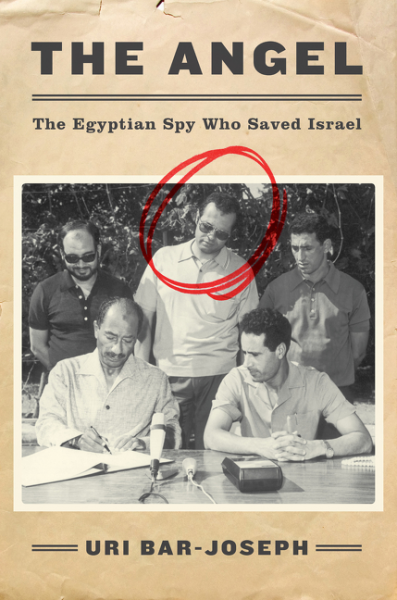Israel’s Egyptian super-spy

Uri Bar-Joseph reveals how the Yom Kippur War could have been lost without the actions of one high-ranking Egyptian official
By Francine Wolfisz, Jewish News, London
As Ashraf Marwan’s body lay lifeless outside his central London flat, speculation arose that the 63-year-old Egyptian businessman had been the victim of a tragic accident or suicide. But the investigation into his shocking death in 2007 — caused by a fall from his fifth-floor apartment — soon became shrouded in something far more sinister when it was revealed he was a former Mossad spy.
Marwan, the son-in-law of former Egyptian President Gamal Abdel Nasser, turned traitor and for nearly 30 years passed his country’s most intimate military secrets to Egypt’s premier enemy, Israel.
So great was his contribution that a former chief of Mossad, Maj. Gen. Zvi Zamir, called him “the best source we ever had.” Marwan is credited with saving Israel, with an advance warning of the Yom Kippur War of 1973.
His intriguing life and suspicious death are detailed in Uri Bar-Joseph’s fascinating new book, The Angel: The Egyptian Spy Who Saved Israel, which features extensive research and interviews with those who knew Marwan.
Bar-Joseph, who will discuss The Angel Nov. 9 as part of the Dayton JCC Cultural Arts & Book Fest, himself has first-hand knowledge of Marwan’s story. He first stumbled across the Egyptian billionaire’s true identity while working as an IDF military intelligence analyst.
In 1998, he was given access to hundreds of documents when he was asked to provide an in-house study on Israel’s intelligence service during the Yom Kippur War.
Although he knew Marwan’s name, he did not reveal it in the book he subsequently wrote about Israel’s intelligence failures, because “he was a great spy, a great asset and I knew we should keep his identity secret.”
That all changed in 2002, when Eli Zeira, the former chief of military intelligence, leaked Marwan’s name to the press — primarily because Zeira believed he was a double agent. Five years later, Marwan was dead and to this day his killers have never been found.
For Bar-Joseph, the story is all the more tantalizing given that Marwan was Nasser’s son-in-law.
“For those of us who are old enough to remember who Nasser was, he was the God of the Arab world in the 1950s and 60s,” he explains. “When Nasser passed away, Marwan then became a very close assistant of President Anwar Sadat.
“Almost everything that passed by Sadat’s desk Marwan could put his hands on. I don’t know of any spy in the 20th century with such great accessibility to information.”
What compelled a close family member of one Egyptian president and a close aide to another to turn traitor and leak his nation’s most valuable secrets?
Bar-Joseph says perhaps not even Marwan himself knew why he became a spy for Israel, but speculates on some of the reasons.
“First of all, there was a matter of money. Marwan loved the good life and under Nasser, who was a very different man, he couldn’t get the money he wanted,” Bar-Joseph says.
“He was also probably frustrated by Nasser’s attitude towards him. The president didn’t want his daughter to marry Marwan, because he suspected he didn’t love her and just wanted to become associated with the family.
“Marwan was also frustrated by the fact Egypt had been humiliated by Israel’s victory in 1967 and Suez in 1969-70 and he wanted to side with the victors, not the losers.
“Finally he had the psychological need for risk and the need for adrenaline. Some people do bungee jumping — for him, it was spying for Israel.”
Whatever the reasons, Marwan’s contributions to Israeli intelligence, which went on until 1998, were said to be unparalleled.

“Here we have one country (Egypt), which plans to attack another (Israel), prepares all the war plans, gets all the arms, does all the training and Marwan reports everything — not just on the tactical level, but on the strategic level.
He gives Israel the Egyptian war plan that was on the desk of the Egyptian high command. It’s really impressive.”
In fact, it was a situation that was almost too good to be true. Some Israeli officers ignored vital information that Marwan had given, believing the Egyptian spy could not be trusted so readily.
But his advance warning of the Yom Kippur War was taken seriously and, according to Bar-Joseph, he single-handedly averted what could have been a disaster for Israel.
“Without this, they would have started preparing only 15 hours later. If this had happened, the Golan Heights would have completely fallen into Syrian hands,” Bar-Joseph says.
“The forces that blocked the Syrian advancement to the Jordan valley were reserve forces mobilized on Yom Kippur, some six hours before the war started.
“Had they not been mobilized on time, the Syrians would have, in a matter of two or three hours, completely occupied the Golan Heights and Israel would have lost the war — something that would have changed the fate of the Middle East.”
Despite the monumental impact Marwan had on Israeli intelligence, very few knew of his covert work. In 28 years, he had only one handler, “something that is very, very rare in the field of human intelligence,” Bar-Joseph says.
None of his Egyptian colleagues had reason to suspect he was working for Israel; neither did his wife Mona. To this day, she believes Mossad, not Egyptian secret services, was behind his murder.
For Bar-Joseph, the exact opposite is true. “I saw Zamir (former chief of Mossad) after Marwan died and he almost cried with frustration. He published his memoirs a few years ago and wrote that he saw it as his personal failure that Marwan died this way.
“Certainly, Mossad didn’t do it and they could do very little to protect Marwan once he became a successful businessman living in London.”
Who killed Marwan? Bar-Joseph speculates that once the super-spy’s identity had been revealed to the media, it was only a matter of time before Egyptian officials decided to take action.
He also draws similarities between Marwan’s death and those of three other Egyptians who have died in London by falling from balconies.
They include actress Suad Hosni, Al-Leithy Nassif, Egyptian ambassador to Britain; and Ali Shafeek, a secretary of former vice president Abdel Hakim Amer. All were involved in Egyptian politics between 1966 and 1971.
“When it became official that he was a Mossad agent, Marwan understood Egypt must do something,” Bar-Joseph says. “They had to get rid of this embarrassment — that the son-in-law of Nasser and one of them was such a traitor — and the only way to deal with it was to get rid of him. This is exactly what I think they did.”
The JCC’s Cultural Arts & Book Fest presents author Uri Bar-Joseph on Wednesday, Nov. 9 at 7 p.m. at the Boonshoft CJCE, 525 Versailles Dr., Centerville. $5 in advance, $8 at the door. R.S.V.P. to 610-1555 or at jewishdayton.org.
To read the complete November 2016 Dayton Jewish Observer, click here.

